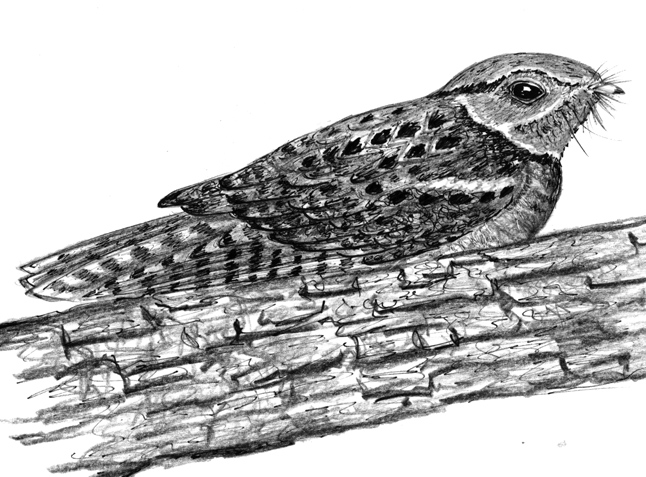
Dear Bird Folks,
I’ve read online that a Chuck-will’s-widow is being heard singing near Sparrowhawk Road Landing in Orleans (MA). I would love to hear one of these birds. Do you know where Sparrowhawk Road Landing is?
– Harry, Brewster, MA
Yes, I do, Harry,
I know exactly where Sparrowhawk Road Landing is. It’s less than two miles from my house. I’ve been there dozens of times to try and hear the aforementioned Chuck-will’s-widow (so far with no luck). In fact, I believe I wrote about this bird a few years ago. But I can write about it again. Studies show that as people age they tend to repeat themselves. Why should I be any different? Why should I be any different?
Let’s begin by explaining to the non-birding readers what kind of bird we are talking about. Chuck-will’s-widows (along with their cousins, the Whip-poor-wills) are a group of birds that are known as “goatsuckers.” These pigeon-sized birds are nocturnal and crepuscular hunters. (Raise your hand if you know what “crepuscular” means. Maybe I’m the only one who had to look it up, but crepuscular refers to creatures that feed in the dim light of dusk or dawn.) Other nocturnal birds, such as owls, have sharp beaks and strong talons, which allow them to capture larger prey. But goatsuckers are noted for having tiny feet and small beaks. Ancient people couldn’t figure out what these birds could possibly be eating at night, so they jumped to the natural conclusion that the birds drank goat’s milk, directly from the goat. Oh, those crazy Ancients.
In reality, Chuck-will’s-widows are insect eaters. Even though their beaks appear to be small, their mouths are actually wicked huge. A Chuck-will’s-widow will capture just about any flying insect it finds, and if it comes across a bat or a small bird, it will eat them as well. Come morning, when they aren’t hunting, Chuck-will’s-widows roost on the ground or on a low exposed branch. Yet, the birds are so cryptically colored they are nearly impossible to spot. Even during the day, finding a Chuck-will’s-widow is harder than finding the TV remote in the couch cushions, or a happy person at the RMV.
Like Whip-poor-wills, Chuck-will’s-widows name comes from their song, which really does sound like, “chuck-will’s-widow, chuck-will’s-widow.” They sing long and loud at both sunset and on moonlit nights. But unlike Whip-poor-wills, which are in sharp decline in Massachusetts, Chuck-will’s-widows appear to be increasing. Once considered to be birds of the Southeast, they have been slowly pushing northward. Here on Cape Cod their signature song is being heard more and more often, but their natural camouflage has made proof of actual breeding birds difficult to obtain.
This brings us to the bird you’ve been reading about on Sparrowhawk Road. For the past five or six years a customer, who happens to live near this area, has told me that she regularly hears a singing Chuck-will’s-widow while walking her dog at night. So several times each summer I visit the small landing and listen for the bird, but each and every time I go I end up hearing nothing, except for the buzzing of mosquitoes around my head. I’ve even looked towards the customer’s house for advice, but the minute she sees me she closes her shades. (That happens to me a lot.)
Once again this spring the woman called to tell me that the Chuck-will’s-widow was back. But by this point, I was getting tired of the drive; after all, it’s nearly two miles. But then last Sunday I noticed the same Web posting you saw and decided to try once more, only this time I dragged Casey along with me. His ears are better than mine, so maybe he’ll have more luck hearing the bird. Around 9:15, after I had finished my evening paperwork, we headed out. The night was cloudy, which is not the best time to go, but we went for it anyway. I took my wife’s convertible, with the roof down. This would allow us to listen from all directions. (Also I didn’t want to get my car muddy if the tide was high.) We sat at the landing for about ten minutes and heard nothing. Even the mosquitoes didn’t show up. Then we got a break. The clouds pushed offshore, which revealed a bright, nearly full moon. Within seconds the air was filled with “chuck-will’s-widow, chuck-will’s-widow, chuck-will’s-widow.” Even though the bird was on Pochet Island, a quarter of a mile away, it sang so loudly I didn’t need Casey’s ears to hear it. We both turned and gave each other a big high-five and then sat back and enjoyed the serenade before eventually heading home. (I wanted to stay longer, but I needed to get my wife’s car back before she realized it was missing.)
The Chuck-will’s-widow has been heard singing from Sparrowhawk Road Landing in East Orleans since early May. It’s getting late in the season so I’m not sure how much longer it will continue, Harry, but it’s certainly worth a try. I suggest going at sunset or on a bright, moonlit night. Sparrowhawk Road Landing is tricky to find, so use your GPS. Just don’t be turned away by all of the area’s “private property” and “no trespassing” signs. The local residents have a touch of paranoia, but the town landing is open to anyone. But be careful. The landing is narrow and turning around can be tricky, especially in the dark. And should the road be muddy when you get there, swing by my house. If my wife is sleeping, I’ll let you borrow her car.